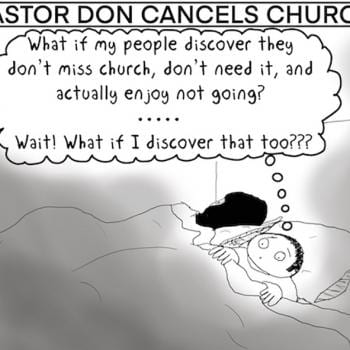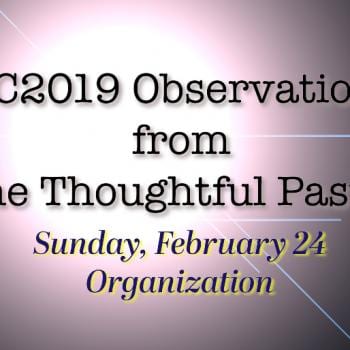The Dallas Morning News had a front page article today about the role faith and churches are playing in the aftermath of the deadly tornadoes in Granbury.
The beginning of the article contains these statements:
In a place where so much has been lost, broken and scattered, many people in this tornado-touched town say they found something they didn’t know was missing.
“I guess you’d call it faith,” said Josiah Thompson, a 26-year-old who decided at the last minute to take his wife and two young children to Granbury Baptist Church on Wednesday night. Thirty minutes later, his rental home exploded in winds up to 200 mph.
“That proves right there that going to church can literally save your life,” said Thompson, . . . Thompson said his faith was renewed in friends and family, who have buried him in cash, clothes and food. And in God, who demonstrated quite clearly that everything important is out of our control.
Thompson, like so many others in this lake-straddling town an hour southwest of Fort Worth, said it’s impossible to live through the fury of an EF-4 tornado and not sense God’s protecting hand.
God’s Protecting Hand?
God’s protecting hand. Oh yes. But how about those who were killed? Were they left out somehow of this miracle of protection?
That’s my first question here. And I’m not going to try to answer it except to say this: tragedies happen to the best of us and to the worst of us. If God is not present in all these tragedies, even those which lead to death, then God is a capricious monster and should not be worshipped. It is wonderful that the family mentioned in the article was spared. But I find it despairingly grievous to suggest that they are more special to God that those whose lives were lost.
Let’s just stop doing that. Please.
The second question revolves around what is happening now: both local and distance churches are, as is normal, responding quickly and generously to those whose homes and lives have been ravaged by the tornadoes. Same thing is happening in West, Texas, after the fertilizer plant explosion there. These stories are written over and over again. In the face of tragedies and natural disasters, people almost instinctively turn to churches. And church people also instinctively turn to service.
Takers AND Givers or Takers OR Givers?
My question: Will those who are on the receiving end of what will be nearly unceasing acts of mercy and charity on the part of church-going folk themselves become part of a worshipping community? Or will they just expect that the church will show up at the next tragedy without their own participation?
Frankly, it is far easier to just stay on the receiving end of this type of charity than it is to become a vital part of a worshipping community, to train oneself for acts of charity, and to learn to pray, “Thy will be done” with faithfulness and hope in the face of hard and complex lives.
Several weeks ago, this spoof piece by Larknews made the rounds on Facebook, passed from clergy person to clergy person. Some, not knowing it was satire, commented, “Wish I could do that.” What was “that?” It was the act of aggressively telling people who are “takers” from church life to either get with the program and start becoming “givers” as well, or just get off the church membership lists.
I understand the temptation.
For the last several weeks, I have been on a combined vacation/study leave. Last year, when I was on Sabbatical leave, I spent every Sunday at a different church. These visits spawned my “Mystery Worship” series.
Week after week, I wandered into different churches and differing worship experiences. I chronicled what I experienced at each one. It was fun–and I also knew I’d never be back at any of those places. I would never establish the kinds of connections there that would offer real life and hope for me–and in which I could offer real life and hope in return.
I was going to do the same this year. And then, suddenly, I just could not. Utter exhaustion accompanied me during this time away.
The intensity of the worship schedule starting in Advent and culminating at Easter, along with some significant issues at church that had to be courageously faced but which left me battered and bruised, combined with some intensely difficult personal issues had left me almost completely empty. The fact that I am still healthy physically leaves me shocked and grateful.
But the thought of walking into someplace full of strangers and seeking to be in a space where I could freely open myself to what I needed, the healing Presence of God, simply flattened me. That which I needed most I could not bring myself to do.
Although I have never minded solitude, thanks be to God, I am finding in my solitary time away greater and greater need for real community. A community that can indeed become vulnerable to God in faithful worship, vulnerable to one another in loving, accountable connections, and vulnerable to the world in sacrificial service. Just popping into a worship service cannot bring that needed connection.
Those who are on the receiving end of sacrificial service in Granbury, West, and countless other locations around the world see one portion of church life. They are essentially doing what I did on my Sabbatical: popping in and receiving. Even so, they rightly must be “takers” for a while.
Those who seek to be givers must go much further and discover the practices the disciplines of the church. This is a lifelong process of forming spiritual connections and learning to be a part of a community.
The Nature of Real Connection
In all my years of loving and serving the church, this one main lesson stands out: we who are connected to one another by our churches are connected not because we are good, or nicer, or more generous than others. We are all exquisitely human, and full of failings. Many of our failings actually see deeper exposure by our very connection through the church.
Furthermore, we have high expectations of each other. Because of that, we fail one another not just mildly but spectacularly. That’s what makes the healthy church and spiritually-based connection so powerful. At its best, it is unbreakable because we learn what it really costs to forgive each other. Once we learn that, we are fully able to worship God, receive forgiveness, and live in grace.
I’ve blogged and thought a lot over the years about our need to be in connection with each other and especially about the situation within my beloved United Methodist Church. Our fights and disagreements with each other are threatening to tear us asunder.
Will We Forgive?
Will we forgive each other?
Will we forgive each other for seeing different versions of the truth even while affirming and humble owning our particular versions?
Will we engage in the disciplines necessary to have adequate connection so we can continue to respond to crises and tragedies?
Will we insist to others and know well ourselves that being only takers ultimately means the destruction of the soul?
Will we bow before the Almighty and Holy One and say, “Thy will be done, even if it means my own death?”
I don’t know. I do know my concerns here add to my weariness. I do know I’m a bit frustrated with my own church community right now where too many stay on the membership rolls only in the role of taker, not giver. Too many who will not engage in the necessary disciplines to learn to know God; too many who expect the pastor to keep them motivated rather than tapping their own motivation; too many who expect others to give generously and sacrificially but who will not even consider the power of the tithe for themselves; too many who see their own life’s challenges as needing everyone’s attention without awareness that everyone suffers.
Yet, each of these also needs forgiveness, support, and the opportunity to transform from being takers to being givers. And I do as well. The process never ends.












